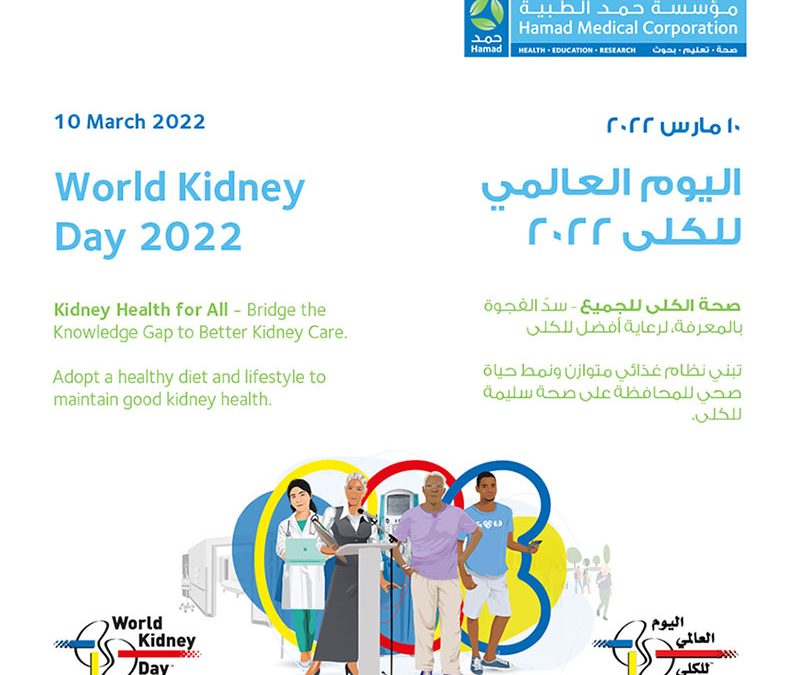To mark World Kidney Day 2022, an expert from Hamad Medical Corporation (HMC) is urging people to learn about the vital role that kidneys play in keeping them healthy.
World Kidney Day is marked annually every second Thursday in March, which this year falls on 10 March and follows the theme, Bridge the Knowledge Gap to Better Kidney Care. The World Kidney Day Joint Steering Committee also declared 2022 to be the year of Kidney Health for All.
CHECK OUT THIS EVENT: World Kidney Day Symposium 2022
Chronic Kidney Disease
Globally, chronic kidney disease causes at least 2.4 million deaths each year and is the sixth fastest-growing cause of death. HMC Head of Nephrology Dr Hassan Al Malki said that kidney disease can affect people of any age, gender and race and it is estimated that one in 10 people in Qatar has some kind of kidney impairment.
According to Dr Al Malki, the kidneys perform many crucial functions including cleaning and filtering waste products out of your blood to produce urine, filtering extra water out of your blood balancing salts and chemicals that are necessary for your body to function.
There may be no signs or symptoms during the early stages of chronic kidney disease and may not become apparent until kidney function is significantly impaired.
Dr Al Malki said that as an organ, our kidneys are highly adaptable and able to compensate for lost function, so signs and symptoms may not appear until irreversible damage has occurred.
It is important that the community be aware of kidney health and how they can protect their kidneys. The signs and symptoms of kidney disease are often non-specific, meaning they can also be caused by other illnesses or can be mistaken for other health conditions.
Signs and symptoms of kidney disease, says Dr Al Malki, can include nausea, vomiting, loss of appetite, fatigue, weakness, sleep problems, changes in how much you urinate, muscle twitches and cramps, swelling of feet and ankles, and high blood pressure. He said that kidney diseases are largely silent, which can largely affect your quality of life.
There are several ways to reduce the risk of developing kidney disease:
- Keep fit and be active: This can help to maintain ideal body weight, reduce your blood pressure and the risk of chronic kidney disease.
- Eat a healthy diet: This can help to maintain ideal body weight, reduce your blood pressure, prevent diabetes, heart disease and other conditions associated with chronic kidney disease.
- Check and control your blood sugar: About half of the people who have diabetes develop kidney damage, but this can be prevented/limited if the diabetes is well controlled.
- Check and control your blood pressure: High blood pressure can damage your kidneys.
- Ensure an appropriate fluid intake: Normally this means eight cups, approximately two litres per day, more if you work outside and during summer.
- Don’t smoke: Smoking slows the flow of blood to the kidneys. When less blood reaches the kidneys, it can decrease their ability to function normally.
- Don’t take over-the-counter anti-inflammatory/pain-killer pills regularly: Common drugs such as non-steroidal anti-inflammatory (NSAIDS)/pain-killer (e.g. drugs like ibuprofen) can harm the kidneys if taken regularly.
- Get your kidney function checked if you have one or more of the ‘high risk’ factors: This includes diabetes, hypertension if you are overweight or have a family history of kidney disease.
For more information about kidney health and World Kidney Day, go to hamad.qa.
Check out Marhaba’s FREE e-Guides for everything you need to know about Qatar.







